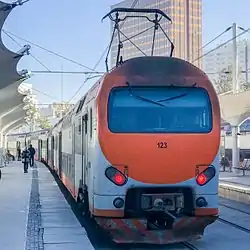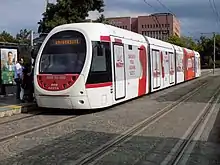Hitachi Rail Italy
Hitachi Rail Italy S.p.A. (HRI) is a rail transport engineering company based in Italy whose main products are the design and manufacturing of railway and mass transit vehicles. Formerly AnsaldoBreda S.p.A., a subsidiary of Finmeccanica, the company was sold in 2015 to Hitachi Rail along with the 40% share of Ansaldo STS that Finmeccanica owned.[2] After the deal was finalized, the current name was adapted in November 2015 to reflect the new ownership.[3]
| Formerly | AnsaldoBreda (2001-2015) |
|---|---|
| Type | Società per Azioni |
| Industry | Engineering |
| Predecessor | Società Italiana Ernesto Breda |
| Founded | 2001 (Merger of Ansaldo Trasporti and Breda Costruzioni Ferroviarie) 2015 (Acquired by Hitachi Rail) |
| Headquarters | , |
Area served | Worldwide |
Key people | Maurizio Manfellotto (President & CEO) |
| Products | Rail transport vehicles |
| Services | Maintenance |
Number of employees | 2,400 |
| Parent | Hitachi (2015–present) Finmeccanica (2001–2015) |
| Subsidiaries | Hitachi Rail USA[1] |
| Website | italy |
History
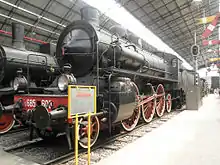
In 1853, the company Gio. Ansaldo & C. was registered in Genoa as a manufacturer of steam locomotives, rail rolling stock and steam engines. The company was supported by the Minister of Finance, Camillo Benso, Count of Cavour, who aimed to reduce the State of Savoy's dependence on imported trains and rolling stock.[4] Ansaldo entered the age of the steam locomotive in 1854 with its model FS113, also known as Sampierdarena.
In 1886, Ernesto Breda founded Ing. Ernesto Breda and C.,[5] the company which became Società Italiana Ernesto Breda (SIEB) in 1899. In 1908 SIEB's thousandth locomotive was built, a model FS 685 with serial number 600[5] now preserved in the Leonardo da Vinci Museum of Science and Technology in Milan. In the 1920s, it was refitted with Caprotti valve gear.[6]
Breda (SIEB) entered the electric locomotive era in 1936 with the production of the FS Class ETR 200 series electric multiple unit. In 1939 this type set the land speed record for rail vehicles[7] at 203 km/h (126 mph).[8] Although only 18 trains of this type were constructed they remained in service for a long time until they were finally withdrawn from service in 1993.
In 1976 the FS ETR 400 entered service. Fiat Ferroviaria manufactured the body and bogies, whilst Ansaldo produced the power unit. It was the first train in the world featuring active body tilting to enter commercial service and was capable of speeds of up to 250 km/h (160 mph).
AnsaldoBreda was formed in 2001 by the merger of Ansaldo Trasporti and Breda Costruzioni Ferroviarie,[9] and was part of the Finmeccanica group.[10] It has production sites at four locations in Italy: Naples, Reggio Calabria, Palermo, and Pistoia.
The TREVI Consortium, of which Ansaldo and Breda Costruzioni Ferroviarie were members, introduced the high speed FS ETR 500 series in 1989.
AnsaldoBreda won the contract for 82 new IC4 trains for the Danish national operator DSB. However, the introduction of the units was plagued by problems, whilst the trains were scheduled to come into service in 2003, the final unit was delivered in 2013.[11] Following more train failures, DSB announced the fleet would be phased out from 2024.[12]
The first high-speed trains to run on Turkish rails were two ETR 500 train sets leased from Trenitalia of Italy and were used for testing the completed part of the high-speed railway network between Eskişehir and Ankara on April 23, 2007.[13] During the tests, ETR 500 Y2 achieved the current rail speed record in Turkey, reaching 303 km/h.[14] The train was capable of exceeding 300 km/h (190 mph). It reached 362 km/h (225 mph) in the Monte Bibele tunnel between Florence and Bologna in 2009, setting a speed record for trains in a tunnel.[15]
Another high speed train Frecciarossa 1000 high speed train was developed in a consortium with Bombardier Transportation.[16][17] The first ETR1000 was christened Mennea in honour of the Italian athlete Pietro Mennea[18] who had died five days earlier. Besides the construction of locomotives, AnsaldoBreda manufactures railway cars, trams, and trains for commuter rail, high-speed rail, and main lines.[19]
Finmeccanica and Hitachi announced on 2 November 2015 the 'closing of transactions' covering the acquisition by Hitachi of AnsaldoBreda and Finmeccanica's 40% stake in Ansaldo STS. Under the agreements signed on 24 February 2015, following a dividend distribution announced on 6 March, the purchase price for Finmeccanica's stake in Ansaldo STS has been set at €9.50 per share, amounting to a total of €761m. The total net consideration to be paid for AnsaldoBreda as a going concern, including property assets, amounts to around €30m. As a part of the deal Finmeccanica would keep the responsibility for some residual contracts.[20]
On 2 November 2015 AnsaldoBreda was sold and changed its name to Hitachi Rail Italy.[3][21][22][23][24] Since acquired by Hitachi, production of some British Rail Class 802 has been shifted to Hitachi Rail Italy's Pistoia plant due to Hitachi Rail's Newton Aycliffe, England plant being at capacity.[25]
Products
DMU and EMU
Tram and light rail
Locomotives
Main operators
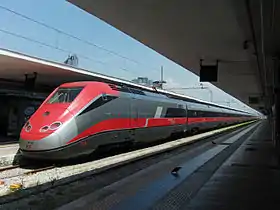

Brazil
- Elettrotreno ETR 200 (Metrostar) for Fortaleza Metro running in the Linha Sul
China
- AnsaldoBreda Sirio for Zhuhai Tram
Denmark
- AnsaldoBreda Driverless Metro for Copenhagen Metro.
- diesel multiple unit IC4 for DSB
Greece
- AnsaldoBreda Sirio for Athens Tram.
- Tri-mode trains for TrainOSE long-distance services capable of operating with electrical supply, diesel engines or onboard batteries, to be delivered from 2022.
Italy
- high-speed ETR 500 for Trenitalia of Ferrovie dello Stato Italiane.[14][26][27][28]
- high-speed Frecciarossa 1000 for Trenitalia of Ferrovie dello Stato Italiane.[29][30]
- locomotive E.402
- locomotive E.403
- multiple unit Treno Servizio Regionale (TSR) for LeNORD.
- multiple unit Treno ad alta frequentazione (TAF) for Ferrovie Nord Milano (FNM).
- multiple unit Caravaggio for Trenitalia and FNM.
- three-car articulated units ETR 211 Metrostar for Circumvesuviana. The Circumvesuviana operate a fleet of twenty-six "Metrostar".[31]
- Meneghino for Milan Metro.[32][33]
- Leonardo for Milan Metro.
- AnsaldoBreda Driverless Metro for Milan Metro and Brescia Metro.[34][35][36]
- AnsaldoBreda Sirio for Tramvie Elettriche Bergamasche of Bergamo.[37]
- AnsaldoBreda Sirio for Rete tranviaria di Firenze of Florence.[38][39]
- AnsaldoBreda Sirio for Naples tramway network of Naples and for Sassari metro-tramway.
Norway
- electric multiple unit NSB Class 72 for Norwegian State Railways. The NSB operates a fleet of 36 trains.[41]
- multiple unit SL95 for Oslo Tramway. Sporveien Trikken operates a fleet of 32 low-floor, articulated trams.[42] Over the years, AnsaldoBreda has updated the equipment to meet the requirements and demands of the operator in Norway.[43][44]
Spain
- multiple unit AnsaldoBreda series S7000 operates mainly on the Line 10 (Madrid Metro) Madrid Metro. The Madrid Metro operates a fleet of 37 trains.[45][46]
- multiple unit AnsaldoBreda series S9000 for the Line 7 (Madrid Metro) Madrid Metro. The Madrid Metro operates a fleet of 53 trains.[47]
Sweden
- AnsaldoBreda Sirio trams for Gothenburg tram network of Gothenburg.[48][49][50]
United Kingdom
- Midland Metro formerly operated a fleet of 16 two carriage T69 trams in Birmingham.[51] The fleet was completely replaced after 14 years of service by CAF Urbos 3 trams in 2015.[52]
- Manchester Metrolink commenced operations in 1992 using a passenger fleet of 26 T-68 trams, with a further 6 (slightly modified) versions supplied by 2000. The entire fleet was gradually replaced by 2013.
- Great Western Railway ordered 36 train sets of British Rail Class 802 which will be produced in HRI's Pistoia facility.
United States
- multiple unit Breda CQ312 class for the Metropolitan Atlanta Rapid Transit Authority. The Metropolitan Atlanta Rapid Transit Authority operates a fleet of 100 cars, car numbers 601-702, built by Breda, 2001–2005.[53]
- multiple unit AnsaldoBreda Type 8 LRV for the MBTA's Green Line in Boston. The Massachusetts Bay Transportation Authority operates a fleet of 95 LRV cars,[54] alongside the MBTA's existing Kinki Sharyo type 7 cars. The Breda cars have been very difficult to maintain and are expected to be outlasted by their predecessors (built by Kinki Sharyo)
- multiple unit AnsaldoBreda LRV for the Blue and Green lines of Cleveland. The RTA Rapid Transit operates a fleet of 48 LRV cars.[55]
- multiple unit AnsaldoBreda P2550[56] for the Los Angeles Metro L Line. The Los Angeles County Metropolitan Transportation Authority operates a fleet of 50 LRV cars.
- multiple unit AnsaldoBreda A650 Breda A650. The Los Angeles County Metropolitan Transportation Authority operates a fleet of 72 vehicles on the B Line and D Line.
- multiple unit AnsaldoBreda LRV2 and AnsaldoBreda LRV3 for the Muni Metro of San Francisco Municipal Railway.[57] The Muni Metro operates a fleet of 151 LRV cars.[57][58]
- multiple units for the Washington Metro. The Washington Metropolitan Area Transit Authority operates:
- 1000-Series—300 units originally built by Rohr, Inc., 290 units were refurbished by Breda; retired in 2017
- 2000-Series—76 units built
- 3000-Series—290 units built
- 4000-Series—100 units built; retired in 2017[59]
- 136 cars for Metrorail (Miami-Dade County) - assembled in Medley by HRI subsidiary Hitachi Rail USA
- 78 cars for Baltimore Metro SubwayLink[60]-Also assembled in Miami by Hitachi Rail USA
- 80 cars for Honolulu Area Rapid Transit (HART)
Controversies
Washington DC Metro 4000 Series railcars
In 1991, 100 4000 Series railcars from AnsaldoBreda were delivered to the Washington Metropolitan Area Transit Authority. These railcars were very similar to the older 2000s and 3000s, which Breda had also built, and featured direct current motors and analogue door controls. Unlike the 2000 and 3000 series cars, which were refurbished by Alstom between 2002 and 2005, the 4000 series cars were never rehabilitated. On July 4, 2010, after several incidents where the doors would open while the train was in motion, (a situation that WMATA techs could replicate in a rail yard) WMATA removed the fleet for repairs until July 20 of the same year. On November 17, 2016, Metro discovered an error in which a 4000-series car would display an incorrect speed limit to a train operator while in manual mode (which is the only mode used since the June 2009 Washington Metro train collision). All 4000-series cars were taken out of service in the afternoon, but were returned to service in the middle of trainsets. The cars were retired from the Metrorail system in 2017. In May 2019, after reports of door malfunctions on some 3000 series trains, the entire legacy (non-7000s) fleet was inspected overnight to make sure it would not happen again.
Delays in the delivery of IC4 trains to Denmark
Delivery of 83 IC4 trainsets for the Danish State Railways DSB was originally planned for 2003-2006. A primary settlement was reached in May 2009. Danish State Railways shall receive the uncompleted trains from AnsaldoBreda, complete the trains itself, and shall certify the trains for public usage itself. AnsaldoBreda will pay back 2.25 billion DKK (300 million Euro).[61]
On 2 July 2012, the DSB announced that the Transportation Authority had approved Denmark's railway operator to put back into operation the fleet of 37 IC4s which had been withdrawn from service in November 2011.[62]
In December 2011, it was reported that one of the missing IC4 trainsets planned for delivery in Denmark was found in Libya.[63] Reportedly, AnsaldoBreda and then-Italian Prime Minister Silvio Berlusconi gave Libyan dictator Muammar Gaddafi the trainset as a present on the occasion of the 40th anniversary of Gaddafi's revolution in 2009.[64][65]
A secondary settlement was reached on 18 December 2012 between AnsaldoBreda and Danish railways. AnsaldoBreda would pay 98 million Euro, provide additional spare parts and upgrade the train control and management system.
The IC4 trains have seen many technical problems during their service. A brake failure caused a collision although the train drove at 30 km/hour over a distance of 121.5 meters.[66] Smoke required that passengers be evacuated.[67] High levels of noise in the cabins meant that modifications had to be made to all delivered trains. Recordings can be heard here. Faulty and incomplete Train Control and Management System (TCMS software) has caused researchers to deem the train unfit for service.[68] Among other things; cracks in axles, faulty sensors and a faulty generator which necessitated an evacuation. A 2014-report by Swiss firm Prose describes severe problems with the engines in the IC4 trains.[69] DSB announced in 2016 that the trains would be withdrawn from service from 2024.[12][70]
Dutch-Belgium Fyra service suspended
V250 train units were delivered to NS over five years later than originally contracted. Soon after the trains went into service in the Netherlands and Belgium, the V250 suffered a number of technical problems. When the first snow fell in the winter of 2012/13, some V250 trains started losing parts of their bottom plates due to ice build-up. Consequently, the Belgian railway company NMBS/SNCB declared the V250 unsafe, and the trains were taken out of commercial service on 16 January 2013.[71] Dutch railways subsequently was seeking compensation for damages[72] and Dutch politicians have called for a parliamentary inquiry into the problems with the V250 train quality issues and AnsaldoBreda's failure to rectify them in a timely manner. On 22 January Belgian railways called on AnsaldoBreda to fix all deficiencies that had been independently identified with the V250 units within 3 months, as agreed in the purchase contract, or the contract would be declared void.[73]
In May 2013, the Belgian railway company cancelled its contract with AnsaldoBreda, after a technical examination of a pair of V250 train halves. The inspections yielded 1159 and 2019 deficiency points, where a total of 9 per full train was the permitted tolerance before rejection. The report mentioned, amongst others, the following defects:[74][75] during a test run, an iron plate of the roof bent towards the overhead wire, axles were severely rusted, with a risk of breaking in moving trains,[76] the brakes were not suited for high-speed trains, wiring was not shielded from rain and snow, a bottom plate came loose and fell down on the railtrack, batteries overheated in carriages that had been already taken out of service, resulting in fire and subsequent scorches in the carriages, earthing points were wrongly connected, causing electric driven heavy oxidation, the door sliding mechanisms were faulty, assembly varied from train to train. On the same day the report was published, the Belgian public broadcasting organizations RTBF and VRT got hold of photographs showing the wrecked conditions the V250 trains were in.[77][78] However, because of major technical problems with these trains, the trains were taken out of rotation within weeks after the start of the service. On the 31st of May 2013, the NMBS/SNCB cancelled the Fyra project entirely.[79][80] On June 3, NS also announced it was stopping operation of V250 trains. According to their survey of the trains it would take at least 17 months to repair all construction flaws, and entry into service would not be expected before 2018.[81] In addition, even if trains were to be repaired, the maintenance cost would be much higher and the lifetime of the trains much lower than agreed in the contracts with AnsaldoBreda. It is currently unlikely that the V250 will enter commercial service again. In a response to the Dutch and Belgian complaints about damage to the trains, AnsaldoBreda blamed the operators for being irresponsible in running the trains at the certified top speed of 250 km/h in winter,[82] and not performing the recommended daily maintenance.[83] Belgian rail operators claim the latter is not true, and that the problems encountered can only be caused by structural problems with the trains.[84]
On March 17, 2014 NS announced a settlement with AnsaldoBreda had been reached. The 9 NS trains will be returned to AnsaldoBreda for a refund of 125 Million Euro, 88 Million Euro less than originally paid. NS will receive an additional compensation for each resold unit to a maximum of 21 Million Euro.[85]
The trains were bought by Trenitalia[86] in 2017 and, since 2019, have been used on the Adriatic line,[87] with part of the services at high speed. They are now known as ETR 700.[88]
Gothenburg tram
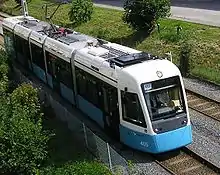
The City of Gothenburg in Sweden has ordered 40 one-directional Sirio trams which were to be put into service on the Gothenburg tram network during 2005 and onwards. The trams were delivered late and functioned poorly when put into traffic. Among reported problems were excessive track damage caused by the trams, malfunctioning air conditioners inside the trams and poor ride quality. The City of Gothenburg therefore withheld a large part of the payment for a delivered tram until fully operational.[89] On December 3, 2009, the city authorities exercised their option for a further 25 trams of the same design at a cost of €61m.[90]
In February 2013, 38 out of the total 40 trams delivered in the first series were taken out of service due to extensive corrosion on the chassis.[91] Repairing the rusted chassis and moldy passenger floors is expected to be completed by 2017,[92] at a cost for Gothenburg council of an extra €10m according to the revised contract, although AnsaldoBreda bears the majority of the cost for these deficiencies. Of the 65 trams purchased, only about 35-40 are usable.[48] Due to further delays on the part of Ansaldobreda with the corrosion repairs and substandard quality in completed works, the council of Gothenburg cancelled the contract for corrosion repairs in November 2015.[48] None of the three repaired trams that AnsaldoBreda delivered was in working order and might actually be scrapped. The investigation launched into the matter found that the trams were jerry-built and that AnsaldoBreda did not have the will, nor the competence to do anything about the problems.[49] It was also discovered that the badly built trams have resulted in extensive track damage that will be very costly to repair, adding to the "fiasco" of the Gothenburg AnsaldoBreda tram affaire.[50]
After the problems had been publicised in Swedish media, AnsaldoBreda chairman Antonio Liguori sent a letter to Gothenburg Municipality which contained threats of concerted actions with other companies against the municipality, along with demands of 10 million euro.[93]
The 31 August the tribunal closed the arbitration see Klart: 120 miljoner för skandalvagnar
Oslo tram
The 32 two-directional trams delivered for Oslo from 1999, called SL95, have met several difficulties with rust during snowy weather and the heavy weight requires a lot of maintenance to streets and tracks, which make the trams expensive to operate.[94][95] They are also considered to create more noise than necessary. The replacement of the trams will start in 2020 and the last trams will be taken out of service in 2024.[96][97]
See also
- Ansaldo
- Breda
- Leonardo S.p.A. (also known as Finmeccanica)
References
- "Hitachi Rail USA opens Miami manufacturing facility | Hitachi in the U.S.A." www.hitachi.us. Retrieved 20 February 2019.
- "Hitachi agrees to buy Ansaldo STS and AnsaldoBreda". Railway Gazette. 24 February 2015. Retrieved 25 February 2015.
- "Hitachi completes Ansaldo deal". Railway Gazette. November 2, 2015. Retrieved December 9, 2016.
- "Cavour e la fondazione dell'Ansaldo - Lezioni di Storia - parte 3, Valerio Castronovo". YouTube. November 29, 2010.
- "BREDA, Ernesto in "Dizionario Biografico"".
- "Tiscali Webspace". webspace.tiscali.it.
- "Forse nel tentativo di raggiungere il primato mondiale di velocità ferroviaria, che appena il mese prima un treno Diesel tedesco in prova aveva portato a 215 km/h, si pensò a una nuova corsa con un ETR.200. L'ingegner Mario Martinelli delle FS ricorda che 'poiché sembrava che la corsa dovesse essere ripetuta, fu prescelto l'ETR.214 per questo secondo exploit... poi l'idea della seconda corsa fu abbandonata: la guerra si avvicinava." Cf Cornolò, Una leggenda op. cit., p. 34.
- Maurizio Panconesi, La direttissima degli Appennini. La linea Bologna-Prato e le sue ferrovie di servizio, Cortona, Calosci, 2002, ISBN 88-7785-179-1, pp. 121-125.
- Company. AnsaldoBreda. Retrieved on 2009-07-17.
- Energy Transportation Archived 2009-04-04 at the Wayback Machine. Finmeccanica. Retrieved on 2009-07-17.
- "Hopplöst tåg hot mot hela DSB". Sydsvenskan (in Swedish). Retrieved 2018-02-01.
- Barrow, Keith. "Denmark to launch tender for electric train fleet". Retrieved 2018-02-01.
- "Hızlı tren artık raylarda".
- "Nuovo record di velocità del treno italiano Etr 500 in Turchia: 303 km/h". Il Sole 24 Ore (in Italian). 2007-09-14. Retrieved 2012-11-11.
- "Raggiunto in galleria il record mondiale di velocità di 362 km/h" (in Italian). fsnews.it. February 2009. Retrieved 2013-04-12.
- Frecciarossa 1000 in cifre (25-09-2012).
- "Il primo Frecciarossa 1000 sarà dedicato a Pietro Mennea - Notizie - FSNews".
- "Addio a Mennea Malago': grazie Pietro - Altri Sport - ANSA.it".
- AnsaldoBreda. AnsaldoBreda. Retrieved on 2009-07-17.
- Hitachi agrees to buy Ansaldo STS and AnsaldoBreda (24 Feb 2015)
- "About Us". Hitachi Rail Italy. Retrieved December 9, 2016.
- "Hitachi agrees to buy Ansaldo STS and AnsaldoBreda". Railway Gazette. February 24, 2015. Retrieved December 9, 2016.
- Masoni, Danilo; Za, Valentina (February 24, 2015). "Finmeccanica agrees sale of rail businesses to Hitachi for $2.2 billion". Reuters. Retrieved December 9, 2016.
- Amano, Takashi; Matsuda, Kiyotaka (February 23, 2015). "Hitachi Agrees to Buy Two Finmeccanica Rail Businesses". Bloomberg. Retrieved December 9, 2016.
- "Great Western AT300 trainsets to be built in Italy", www.railwaygazette.com, 22 December 2015
- "Nuovo record di velocità sulla linea AV Milano-Bologna" (in Italian). FSNews. 2008-03-03. Retrieved 2008-12-31.
- "Record italiano di velocità" (in Italian). Tutto Treno. April 2008. Archived from the original on December 29, 2008. Retrieved 2009-01-02.
- "200 giorni al primo treno Alta Velocità sulla Milano-Bologna" (in Italian). FSNews. 2008-05-28. Retrieved 2008-12-31.
- Chiandoni, Marco (30 August 2012), "Trenitalia unveils ETR 1000 mock-up", International Railway Journal
- "Trenitalia unveils Frecciarossa 1000", www.railwaygazette.com, 20 August 2012
- "Ecco "Metrostar", il nuovo treno della Circumvesuviana - Napoli la Repubblica.it".
- "Milan Metro Meneghino" (PDF). AnsaldoBreda. Retrieved 19 October 2011.
- "Metropolitana più comoda e sicura con il nuovo treno "Meneghino"". Corriere della Sera. 20 March 2009. Retrieved 19 October 2011.
- "500 million euro Italian metro deal". International Railway Journal. April 2006. Retrieved 17 November 2009.
- "Copenhagen Metro". Arcspace. Archived from the original on 30 July 2009. Retrieved 15 November 2009.
- AnsaldoBreda. "Driverless metros" (PDF). Archived from the original (PDF) on 7 September 2017. Retrieved 14 November 2009.
- "Il tram Sirio, Progetto T1". 14 February 2013. Archived from the original on 24 September 2015. Retrieved 3 November 2011.
- "In quarantamila su Sirio". Corriere Fiorentino. 14 February 2010. Retrieved 3 November 2011.
- "Tutti pazzi per Sirio Boom di viaggiatori in tram". la Repubblica Firenze. 18 January 2011. Retrieved 3 November 2011.
- "Morocco's railway acquires 24 new EMU".
- Johansen, Magne (2 June 2013). "Fiaskotrikker og suksesstog er fra samme fabrikk" (in Norwegian). Oslo By (Aftenposten). Retrieved 2 June 2013.
- "SL 95 (PDF in Norwegian)" (PDF). Archived from the original (PDF) on September 28, 2013.
- Blix, Håvard (2001). "SL95". Lokaltrafikk (in Norwegian). 46: 38.
- Blix, Håvard (2001). "SL95". Lokaltrafikk (in Norwegian). 47: 41–42.
- "Ampliación del Metro de Madrid 1999-2003. Trenes Serie 7000". 15 April 2013. Archived from the original on 15 April 2013.
- Serie 7000 Archived October 3, 2013, at the Wayback Machine
- Serie 9000 Archived October 3, 2013, at the Wayback Machine
- "Göteborgs stad häver avtal med Ansaldobreda". Göteborgsposten. 2 Nov 2015. Retrieved 5 November 2015.
- "Göteborgs stad har tröttnat på Ansaldobreda". Upphandling 24. 9 Sep 2015. Retrieved 25 January 2016.
- "Väl utförd upphandling av rostiga spårvagnar". Upphandling 24. 14 Feb 2014. Retrieved 25 January 2016.
- Boynton (2001), p.80.
- "Work on £40m Midland Metro tram fleet to start in weeks « Express & Star".
- "Hitachi Rail" (PDF).
- Bierman, Noah (November 12, 2007). "T will take 10 new cars for its busy Green Line". The Boston Globe.
- Exner, Rich (June 3, 2005). "Rebuild is anything but rapid RTA's first Breda-car renovations: over budget and behind schedule". The Plain Dealer. p. B3. Retrieved 2007-06-11.
- "Rail Division Capacity Assessment Report" (PDF). Los Angeles County Metropolitan Transportation Authority. 2008-06-19. Retrieved 2016-11-07.
- "2010 SFMTA Transit Fleet Management Plan" (PDF). San Francisco Municipal Transportation Agency. Retrieved 3 March 2013.
- Nolte, Carl (December 10, 1996). "Stylish New Streetcars Ready to Roll". San Francisco Chronicle. Hearst Communications, Inc. Retrieved February 14, 2009.
- "Hitachi Rail" (PDF). Archived from the original (PDF) on 2015-09-23. Retrieved 2013-06-11.
- "MDOT MTA Wins Approval for $400.5 Million Purchase of Metro SubwayLink Railcars and Train Control System - Maryland Transit Administration". mta.maryland.gov.
- "REPORT ON DSB'S PROCUREMENT AND COMPLETION OF IC4 AND IC2 TRAINS" (PDF) (Press release). Rigsrevisionen’s. June 2012.
- "DSB: IC4 in servizio".
- "Tjek selv - Gadaffis Luksus-IC4 afsløret på Google Earth". 21 December 2011.
- "IC4 train a gift from Berlusconi to Gadaffi". The Copenhagen Post. 2011-02-21. Retrieved 2016-11-07.
- "DSB: Vi aner intet om Gadaffi-tog".
- "Havarikommissionen: Ingen aner, hvorfor IC4-bremserne svigter". ing.dk (in Danish). Retrieved 10 October 2014.
- "IC4-passengers evacuated due to smoke". ing.dk. Retrieved 10 October 2014.
- "Researcher after new computer problem in IC4: This train is unfit for service". ing.dk. Retrieved 10 October 2014.
- "IC4-report: Engines also affected by considerable failure". ing.dk. Archived from the original on 9 August 2017. Retrieved 9 August 2017.
- "Some Danish trains falling to pieces on the track". cphpost.dk (in Danish). The Copenhagen Post - Danish News in English. Retrieved 2018-02-01.
- "on 2013-01-18".
- "NS stelt fabrikant Fyra aansprakelijk voor problemen - NU - Het laatste nieuws het eerst op NU.nl". www.nu.nl.
- News (22 January 2013). "AnsaldoBreda given three months to solve Fyra problem".
- llo, gjs, bvb, rvs. "NMBS ontbindt contract met constructeur Fyra".
- "Fyra: de trein met 2.019 strafpunten".
- "Dit is er mis met de Fyra". Scribd.
- "La SNCB va casser le contrat avec le constructeur italien du Fyra". 31 May 2013.
- Retrieved on 2013-05-31
- Vosman, Quintus. "No end in sight for Fyra problems".
- "NMBS bevestigt: Fyra definitief op zijspoor gezet". 31 May 2013.
- "NS stopt met Fyra".
- "Page not found - Global Rail News". Archived from the original on 2013-06-09. Cite uses generic title (help)
- "Fyra-bouwer verwerpt kritiek: 'aanbevolen onderhoud niet uitgevoerd' - Buitenland - de Volkskrant".
- "Belgische spoorwegen niet te spreken over persconferentie Italianen - Buitenland - de Volkskrant".
- "NS stuurt Fyra terug naar Italië en krijgt 125 miljoen - Magazine - de Volkskrant".
- 2017-08-15T15:35:23. "Trenitalia agrees to acquire V250 trainsets". Railway Gazette International. Retrieved 2021-01-21.
- "Trenitalia's ETR700 ex-Fyra trains to enter service on Adriatic Corridor | News | Railway Gazette". web.archive.org. 2019-10-31. Retrieved 2021-01-21.
- "Frecciargento ETR 700 - Trenitalia". www.trenitalia.com. Retrieved 2021-02-01.
- "Göteborgs nya spårvagnar ett fiasko". Archived from the original on 2016-01-31. Retrieved 2016-01-25.
- "Göteborg exercises tram option". Archived from the original on 2016-03-06. Retrieved 2016-01-25.
- "40 vagnar tas ur trafik på grund av rost". Archived from the original on 2013-02-16. Retrieved 2013-02-12.
- "Rostiga spårvagnar tar tre år att laga". Göteborgsposten. 3 September 2014. Retrieved 3 September 2014.
- "Hemliga dokument: Göteborg krävs på 100 miljoner". Göteborgsposten. 27 May 2016. Retrieved 16 June 2016.
- NRK. "Alle Italia-trikkene har rustskader". NRK (in Norwegian Bokmål). Retrieved 2018-01-07.
- "Blir dette den nye Oslo-trikken?". Aftenposten (in Norwegian Bokmål). Retrieved 2018-01-07.
- NRK. "Vil bytte ut alt". NRK (in Norwegian Bokmål). Retrieved 2018-01-07.
- Acando. "Fremtidens byreise". www.fremtidensbyreise.no (in Norwegian). Retrieved 2018-01-07.
Further reading
- Giovanni Cornolò, Una leggenda che corre. Breve storia dell'elettrotreno e dei suoi primati. ETR.200 - ETR.220 - ETR 240, 2. ed., Salò, Editrice Trasporti su Rotaie, 1990, ISBN 88-85068-23-5
- Stefano Garzaro, Angelo Nascimbene, FS-Italia. Elettrotreno ETR 400 "Pendolino", collana Monografie ferroviarie n. 6, Torino, Edizioni Elledi, 1982
